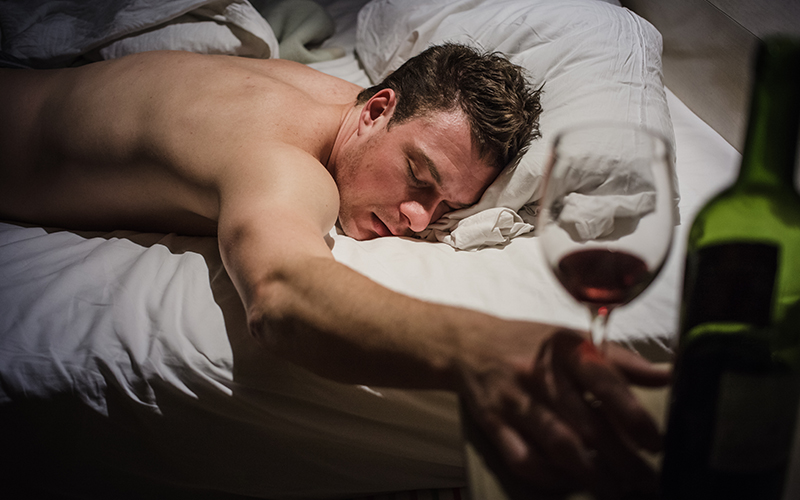Sleep Better with Alcohol?
Alcohol is considered the most common sleep aid; with over 20 percent of Americans admitting that they drink right before bed in order to get to sleep faster. With one out of every five people using alcohol as a sleep aid, we decided to ask the question: “does it really help you sleep well?”
While alcohol does cause drowsiness, (aiding in the initial process of falling asleep), it also causes interrupted sleep and interferes with the amount of sleep you actually achieve. Add to these key factors the side effects of temperature deregulation and disturbed rapid eye movement (REM) sleep, and you’ve got the ingredients for an unhealthy lifestyle.
The Big Problem with Using Alcohol As a Sleep Aid
Using alcohol as a sleep aid is inherently dangerous for a number of reasons.
The biggest of which is the fact that alcohol is addictive. The notion that you will use just one drink to get a jump on getting to sleep is quickly trumped by the fact that your body develops a tolerance for the drug.
As your body develops a tolerance, you require more and more alcohol to achieve the same desired results. Slipping into alcoholism is a very real possibility.
According to Talbot Recovery, alcoholism profoundly affects the brain, heart, pancreas, liver and immune system. Understanding the dangers of alcohol abuse and its impact on your sleep cycle can help you make healthier decisions.
How does Alcohol Interact with Sleep?
All right, you may be thinking, “hey… I’m not an alcoholic. I just use alcohol to help me sleep.” Okay, let’s take a look at what really happens when you use alcohol as a sleep aid.
- Alcohol is a diuretic. It causes you to need to get up and go to the bathroom. This (in most cases) does not take place while sleeping. Your body wakes you up, thereby interfering with the intent of sleeping.
- Alcohol induces or worsens the effects of snoring, and can lead to a very serious medical condition known as Obstructive Sleep Apnea.
- Also, alcohol causes abrupt transitions in the sleep cycle, causing more vivid dreams and less restorative sleep.
- And it brings on excessive sweating during sleep. This can cause you to wake, often with sheets, mattress or pillows completely soaked.
The Link between Alcoholism and Insomnia
Both insomnia and alcoholism can become chronic conditions, and it’s not uncommon to find them co-existing together.
Alcoholics in recovery often discover that not only does the use of alcohol cause sleep problems, but those who quit using also experience periods of insomnia as a symptom of withdrawal.
The good news is, upon embarking on the road to abstinence, sleep latency returns to normal just a few months after quitting.
The Value of a Good Night’s Sleep
Your body requires a complete sleep cycle, including stages where alpha waves turn to theta waves, which give way to spindle wave and finally the delta waves, upon which REM sleep takes place.
In order to experience restorative sleep and have a productive waking cycle, several REM cycles must be completed each and every night. Without achieving such, the quality of your waking hours is compromised. This may even cause problems with your ability to function.
Practicing Healthy Sleep Hygiene
One of the most important elements in establishing healthy sleep hygiene is knowing just how much sleep your body requires each night.
This is different for everyone, and will also shift for you as you encounter the various stages or cycles of life. You can check this infographic from the National Sleep Foundation for average amounts of required sleep based on your age.
Here are some helpful sleep hygiene tips:
- Limit daytime naps to 30 minutes. Napping doesn’t make up for inadequate nighttime sleep, but may help improve alertness and performance.
- Avoid acidic, fried or spicy foods right before sleep. These are well-known triggers to indigestion and GERD (gastoresophageal reflux disease).
- Exercise lightly (walking, yoga, etc.) for 10 minutes before heading to bed. Don’t overdo this. The goal is to get your metabolism started, but not to overexcite your system to the point of being unable to shut down during sleep.
- Establish a bedtime routine, and then stick to it. We are creatures of habit, and our bodies respond well to routines. Taking a warm shower or reading a book just before bed – and then going to bed at the same time every night (even on the weekends) is most beneficial.
Final Thoughts
We’ve established that while alcohol can help make you sleepy – it is actually counterproductive when it comes to the desired outcome of getting healthy, restorative sleep.
We’ve offered you some great tips on how to improve your sleep hygiene.
In order to achieve the most benefit from your sleep, make sure that your bedroom is optimized to help.
Your mattress and pillows affect your sleep in huge ways. This is not a place to cut corners or pinch pennies. Find what you love, and get it. Light coming from televisions, tablets or cellphones can cause significant damage. Damage to your circadian rhythms, and should be avoided if possible.
And finally, if you’re able to control the temperature of your bedroom, science suggests that the range between 60-67 degrees is optimal.
Resources:
- https://www.tuck.com/alcohol-and-sleep/
- https://sleepfoundation.org/sites/default/files/STREPchanges_1.png
- https://www.medicinenet.com/gastroesophageal_reflux_disease_gerd/article.html
- https://sleepfoundation.org/sleep-topics/sleep-hygiene
A New Outlook Counseling Services stands ready to help. Help those struggling with addiction and those who love them through the sometimes turbulent waters of recovery. With four offices in the Denver metro area, getting help is easier than ever. The Healing Begins Here.


Recent Comments